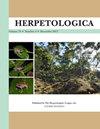Notes on the Hyperossified Pumpkin Toadlets of the Genus Brachycephalus (Anura: Brachycephalidae) with the Description of a New Species
IF 1.1
3区 生物学
Q2 ZOOLOGY
引用次数: 5
Abstract
Abstract Four species of pumpkin toadlets are currently recognized by the extreme condition of hyperossification in the skull and vertebral column within the genus Brachycephalus. In addition to their larger body size, relative to other congeneric species, Brachycephalus darkside, Brachycephalus ephippium, Brachycephalus garbeanus, and Brachycephalus margaritatus share remarkable osteological features, such as the large paravertebral plates forming an ornamented dorsal bone shield, visible through the integument. We add to the current knowledge of this group by analyzing its diversity and describing a new hyperossified species from some important Atlantic Forest remnants in southeastern Brazil, including those bordering São Paulo, the largest and most populous city in South America. The new species is diagnosed by a combination of morphological, osteological, and bioacoustic characters, with further evidence of mtDNA sequences to confirm its distinction from the other congeners. The parotic and paravertebral bone plates externally bordered with a rough and pale contour can readily distinguish the new species from the other hyperossified species within Brachycephalus. The new species is widely distributed along the Serra do Mar mountain range, including the regionally named Serra de Paranapiacaba, in elevations from 700 to 1000 m above sea level (a.s.l.), in the central coast of the state of São Paulo, southeastern Brazil. We discuss valuable morphological characters within this group of species, reinforce the need for further studies, and highlight the relevance of protected areas for biodiversity conservation in metropolitan regions.短头蟾蜍属超骨化南瓜蟾蜍记述(无尾目:短头蟾蜍科)及一新种记述
摘要目前,在短头蟾蜍属中,有四种南瓜蟾蜍因颅骨和脊椎骨质疏松而被识别。除了体型更大之外,相对于其他同类物种,暗侧短头藻、细鳍短头藻(Brachychalus ephippium)、垃圾短头藻和玛格丽塔短头藻具有显著的骨学特征,例如巨大的椎旁板形成了一个装饰性的背骨盾,通过珠被可见。我们通过分析该群体的多样性,并描述了巴西东南部一些重要的大西洋森林遗迹中的一个新的超分类物种,包括与南美洲最大、人口最多的城市圣保罗接壤的物种,从而增加了对该群体的现有知识。该新物种通过形态学、骨学和生物声学特征的结合进行诊断,并通过线粒体DNA序列的进一步证据证实其与其他同类物种的区别。在短头目中,腮腺和椎旁骨板外部边缘有粗糙和苍白的轮廓,可以很容易地将新物种与其他高分类物种区分开来。该新物种广泛分布在Serra do Mar山脉沿线,包括巴西东南部圣保罗州中部海岸海拔700至1000米的地区命名的Serra de Paranapiacaba。我们讨论了这组物种中有价值的形态特征,强调了进一步研究的必要性,并强调了保护区对大都市地区生物多样性保护的相关性。
本文章由计算机程序翻译,如有差异,请以英文原文为准。
求助全文
约1分钟内获得全文
求助全文
来源期刊

Herpetologica
生物-动物学
CiteScore
4.60
自引率
0.00%
发文量
27
审稿时长
>12 weeks
期刊介绍:
Established in 1936, Herpetologica is a quarterly peer-reviewed journal serving herpetologists, biologists, ecologists, conservationists, researchers and the scientific community. The journal contains original research papers and essays about the biology of reptiles and amphibians, and covers many relevant topics including: behavior, conservation, ecology, genetics, morphology, physiology and taxonomy.
 求助内容:
求助内容: 应助结果提醒方式:
应助结果提醒方式:


